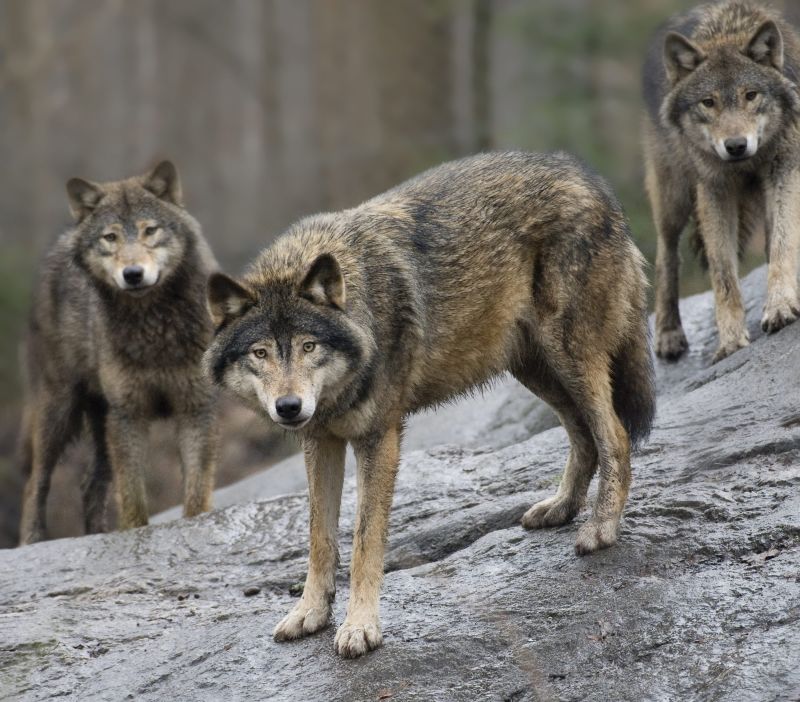Sweden began its annual wolf hunt this week, allowing nearly 10% of the endangered species population to be killed, as conservationists raise concerns about the controversial policy.
Since 2010, Sweden has allowed wolves to be hunted on a licensed quota basis. Conservationists say this goes against European Union law and have filed complaints with the EU Commission, which has previously said it is assessing Sweden’s compliance.
Hunted to the point of extinction by the 1970s, wolves have gradually returned to the northern European country, aided by EU conservation legislation.
But now the government is allowing 30 of the estimated 375 animals there to be culled, citing safety concerns for rural dwellers and livestock owners.
It’s part of the government’s effort to drastically reduce the overall number of wolves in the country – from a previous minimum population of 300 to a new minimum of 170. This minimum number, under Sweden’s Environmental Protection Agency, is referred to as a “favorable reference value.”
This is despite the wolf’s status as “highly threatened” on The Swedish Red List, which monitors the extinction risk of species in the Nordic country.
Conservationists were further alarmed last month when the Council of Europe’s Bern Convention committee, which includes 49 countries and the European Union, voted in favor of an EU proposal to lower the protection status of wolves from “strictly protected” to “protected.” The convention was originally established to protect species and habitats.
“Strictly protected” status meant wolves could not be deliberately killed or captured, but with the downgrading, the Council of Europe says member states will now have “additional flexibility” when managing their local wolf populations.
The World Wide Fund for Nature (WWF) responded to the decision, calling the EU’s move to weaken wolf protections “a serious misstep, devoid of any solid scientific foundation.”
Conservationists are concerned that if wolf numbers decline there will be an even greater likelihood of genetic problems within the population.
He accused the Swedish government of having “an anti-wildlife sentiment,” saying it had “a much more aggressive anti-carnivore policy” than previous governments.
But some conservationists think the wolves are being used as a political bargaining chip.
Just 3% of the Swedish population are hunters, according to Widstrand, who says those 300,000 people are “crucially important” to the country’s two main political blocs, who are often neck and neck in the polls.
“The hunting organizations have the ears of the politicians,” said Magnus Orrebrant, Chair of the Swedish Carnivore Association (SCA), which advocates for the coexistence of people and carniverous animals, like wolves and bears.
Wolves in Europe
Anti-wolf sentiment is growing elsewhere in Europe too.
A pony belonging to European Commission President Ursula von der Leyen’s was killed by a wolf in 2022. She made a statement in 2023 saying that “the concentration of wolf packs in some European regions has become a real danger for livestock and potentially also for humans,” which prompted several wildlife and conservation charities, including the WWF, to issue a response, calling her words “misleading” and “not based on science.”
Von der Leyen welcomed the news last month that the Bern Convention committee had decided to adjust the protection status of wolves, calling it “important news for our rural communities and farmers… because we need a balanced approach between the preservation of wildlife and the protection of our livelihoods.”
It’s true that the wolf population in Europe has increased over recent years. Wild Wonders’ Widstrand calls it “a major, fantastic comeback conservation story.”
There are approximately 1,500 wolves in Germany and 3,300 in Italy, according to conservation reports. Widstrand notes there are even 120 wolves in Belgium. “These countries are vastly smaller than Sweden and more densely populated,” he pointed out.
Yet rural affairs minister Kullgren says wolves are affecting Swedish society “more significantly than before.”
Kullgren said there were “parents who are afraid of letting their children play in their backyard, farmers who are afraid to let the animals out to graze due to the risk of wolf attacks and dog owners who are afraid that their beloved pets might get attacked while walking on forest paths.”
“The government is very much adding fuel to the polarized debate,” she added.
Orrebrant, chair of the SCA, said that if the EU follows the Bern Convention committee’s decision, which comes into effect on March 7, and decides to downgrade the wolf’s protection status, “that will allow countries like Germany, Italy or Spain to hunt in the same way that Sweden does.”
In parts of northern Europe, self-sufficiency has become increasingly important against the backdrop of Russia’s war against Ukraine.
Sweden officially joined NATO last year and just a few months later it joined Norway in distributing booklets to millions of households with guidance on how residents could sustain themselves in the event of war, including details on how to grow food at home.
For livestock farmers involved in food production, this national agenda is further encouragement to lower Sweden’s population of large carnivores.
He believes the licensed wolf hunt is a necessary additional measure in the protection of livestock, adding that it is expensive for smaller farmers to install special, predator-proof fencing.
But Rindevall said that sheep are often used in the argument for wolf culling, even though she says only a tiny fraction of Swedish sheep are killed by wolves.
She is concerned about the message it sends to other countries, that a highly resourced country like Sweden is taking what she considers to be a regressive stance on conservation.
“How can we ask other countries to preserve animals like tigers, lions and elephants when we can’t seem to co-exist with wolves?”

